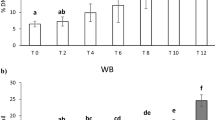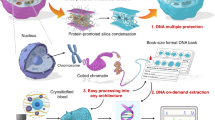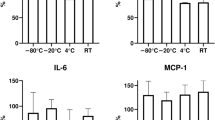Abstract
IN an earlier investigation1,2, we have demonstrated that storage for 2 h at 37° C in Tyrode solution causes hæmopoietic cells to lose a considerable part of their capacity to induce, through a graft reaction to the host, secondary syndromes in the irradiated allogenic recipient, whereas their capacity to restore myeloid tissue is not noticeably affected.
This is a preview of subscription content, access via your institution
Access options
Subscribe to this journal
Receive 51 print issues and online access
$199.00 per year
only $3.90 per issue
Buy this article
- Purchase on Springer Link
- Instant access to full article PDF
Prices may be subject to local taxes which are calculated during checkout
Similar content being viewed by others
References
Mathé, G., Amiel, J. L., Schwarzenberg, L., and Méry, A. M., C.R. Acad Sci.,, Paris, 255, 2863 (1962).
Mathé, G., Amiel, J. L., Schwarzenberg, L., and Méry, A. M., Blood, 22, 44 (1968).
Author information
Authors and Affiliations
Rights and permissions
About this article
Cite this article
AMIEL, J., MATHÉ, G. A Comparison of the Sensitivity to Storage at 37° C in Tyrode Solution of Immunologically Competent Cells and of Myeloid Cells. Nature 200, 1224–1225 (1963). https://doi.org/10.1038/2001224a0
Issue Date:
DOI: https://doi.org/10.1038/2001224a0
Comments
By submitting a comment you agree to abide by our Terms and Community Guidelines. If you find something abusive or that does not comply with our terms or guidelines please flag it as inappropriate.



